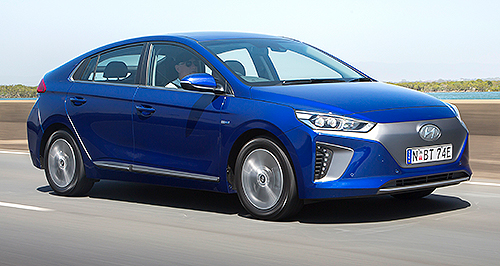Make / Model Search
News - HyundaiHyundai calls for bipartisan EV supportCharged up: The lack of government support for electric and low-emissions vehicles has not deterred Hyundai Motor Company Australia from rolling out the Ioniq small car range. Authorities lag behind growing consumer electric vehicle interest in Australia29 Nov 2018 HYUNDAI has joined the call for greater governmental commitment to electric vehicles (EVs) in Australia, suggesting a bipartisan approach between the two major political parties at both federal and state levels to boost consumer uptake in the form of financial incentives pertaining to the purchasing, running, parking and charging infrastructure.
Speaking to GoAuto at the launch of the Hyundai Ioniq EV, plug-in hybrid and hybrid small-car range in Brisbane this week, Hyundai Motor Company Australia (HMCA) chief operating officer Scott Grant said unless government action is taken, Australian motorists may miss out on life-enhancing technologies in the future, and instead be relegated to driving less-advanced vehicles designed for developing markets.
“What we need is some sort of vision and some sort of certainty about EVs,” he said. “It’s an area of uncertainty… where there is not a lot of government support for these kinds of technologies and innovations. We need incentives for consumers to embrace this kind of emerging opportunity because there is policy uncertainty.”
Mr Scott added that supporting EVs would fulfil both major parties’ desire to keep Australia at the forefront of advanced technologies.
“Maybe I’m dreaming, but it would be great to have a bipartisan position on these kinds of issues,” he said.
“Somebody has to have a vision that says: ‘What kind of country do we want to have in respect to our motor vehicle market in Australia?’
“Do we want to be at the forefront of the best products and technology and innovation that the world has to offer? Do we want to be a market that is perhaps following three to four years later? Or do we want to be a – not a third-world market – but somebody who is really focussed perhaps more on the rejects of other markets and that we’re decades behind?’
“I think we need some certainty as to ‘who are we’ firstly, and then what kind of market will we have as a result or opportunity, then car companies like ours and consumers ultimately can play in that place.
“We’re uncertain whether we dream of being high tech, and we want to match Europe in other respects – and we hear that from time to time – but there’s no real actions that commit to that. So, do we really want that or is that really not possible or practical for our size economy and so forth.”
Admitting it is a financial gamble, Mr Scott is hopeful that Hyundai’s beating of the EV drum in Australia with the Ioniq, Kona Electric EV and, in the future, Nexo hydrogen fuel-cell vehicle, will help spur the relevant governments into introducing policies conducive to their consumer uptake.
“It is an element of a leap of faith if you will and it is a little bit risky (bringing EVs to this market),” he admitted. “Because we are set up as such that these products need some commercial outcomes. We are not a charity.
“(But) we see an opportunity in the narrative that’s coming from the government in the federal and state level in the last few years, we see that increasing in its depth and its magnitude (especially as) people are interested in renewable technologies, (alternative) fuels and so on.
“We’re hearing more governments talk in that way (and that’s giving us some confidence even if we’re not seeing action as yet), and that’s getting some media attention and interest in the public, and equally in varying ways you see there are various public interest groups and others that are taking an interest in this space.
“But some government action certainly would really be nice.”  Read more |
Click to shareHyundai articlesResearch Hyundai Motor industry news |












Facebook Twitter Instagram